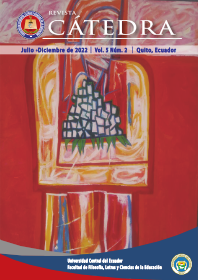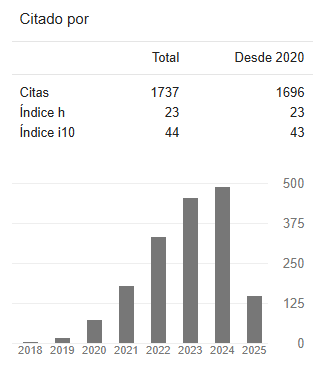Education and social economic training
DOI:
https://doi.org/10.29166/catedra.v5i2.3585Keywords:
formal education, economic infrastructure, legal-political infrastructure, ideological superstructure, ideological apparatusesAbstract
In recent decades, official discourses have attributed to education the power to solve all social phenomena that threaten and undermine life. This paper aims to specify and provide elements that allow an understanding of the relationship between education and society. Based on the concepts of education and social economic formation, our objective is to describe the relationship between: 1) education and economic infrastructure; 2) education and juridical-political superstructure; and 3) education and ideological superstructure. The study is theoretical in nature. The philosophical perspective used comes from the postulates of historical materialism and critical pedagogy. The methodology applied is based on the main guidelines of the qualitative approach, with a descriptive level of depth. The bibliographic method was used, as well as the techniques of text analysis, summaries and conceptual schemes. In the conclusions, it is exposed that the described relations allow: 1) to accelerate the qualification of the labor force; 2) to guarantee the respect for the division of labor and, to naturalize exploitation as a form of relation between human beings; 3) to create the political-legal conditions for the reproduction of the mode of production, through the joint action of the State-right-education; 4) to consolidate the ideological hegemony of the dominant social class, through the school and the official curriculum.
Downloads
References
Ahmed, N., Marriott, A., Dabi, N., Lowthers, M., Lawson, M., y Mugehera, L. (2022). Las desigualdades matan. [Informe de OXFAM de 2022]. OXFAM Internacional. https://bit.ly/35Adoq9
Althusser, L. (1988). Ideología y aparatos ideológicos del Estado. Freud y Lacan. (Primera edición). Nueva Visión.
Apple, M. (1997). Educación y poder. Editorial Paidós.
———. (2008). Ideología y currículo. Ediciones Akal S. A. https://bit.ly/3raBMGZ
CEPAL. (2018). La Agenda 2030 y los Objetivos de Desarrollo Sostenible. Una oportunidad para América Latina y el Caribe. Santiago. https://bit.ly/3w5osGB
Cisneros, I. (2014). Norberto Bobbio de la Razón de Estado al Gobierno Democrático (Primera edición). Instituto Electoral y de Participación Ciudadana. https://bit.ly/3Hho5fk
Cueva, A. (2004). La Teoría Marxista. Categorías de base y problemas actuales. Comisión Universitaria del PCMLE.
Fernández, M. (1995). La escuela a examen. Un análisis sociológico para educadores y otras personas interesadas. Ediciones Pirámide, S.A. https://bit.ly/3KTE5Go
Freire, P. (1970). Pedagogía del oprimido (Primera. edición). Siglo XXI.
———. (1990). La naturaleza política de la Educación. Cultura, poder y liberación. Ediciones Paidós.
Gallardo, P., y Camacho, J. (2008). Teorías del Aprendizaje y práctica docente. Wanceulen Editorial Deportiva, S. L. https://bit.ly/3gbXp3C
Gramsci, A. (1971). El Materialismo Histórico y la Filosofía de Benedetto Groce. Ediciones Nueva Visión.
———. (1987). Educación y Sociedad (Tercera edición). Editorial tarea.
Han, B.-C. (2014). Psicopolítica. Neoliberalismo y nuevas técnicas de poder (Primera edición digital). Herder Editorial S.L.
Hernández, R., Fernández, C., y Baptista, M. del P. (2014). Metodología de la Investigación (Sexta edición). McGraw-Hill. https://bit.ly/3rbogTw
Küttler, W. (2014). Formación Social (Gesellschaftsformation). Revista Internacional Marx Ahora, (37), 156-169.
Lenin, V. (1997). El Estado y la Revolución (Primera edición). Fundación Federico Engels. https://bit.ly/3oaW0hX
Marenales, E. (2013). Tipos de educación (Formal, no formal e Informal). Academia, 1-9.
Marx, C. (1975). El Capital. Tomo I (Primera edición en español). Siglo XXI. https://bit.ly/3HhbHM4
Marx, C., y Engels, F. (1948). Manifiesto Comunista (Edición del centenario). Babel. https://bit.ly/3INuAqn
Muñoz-Conde, F. (1999). Teoría General del Delito (Segunda edición). Editorial Temis. https://bit.ly/3g6uvlx
Nikitin, P. (1959). Manual de economía política. Editorial Alberto Crespo Encalada.
Nino, C. (2003). Introducción al análisis del derecho (Segunda edición). Editorial Astrea.
Pasukanis, E. (1976). Teoría General del Derecho y Marxismo. Labor Universitaria Monografias. https://bit.ly/3uaG8Qs
Rosental, M., y Iudin, P. (1946). Diccionario Filosófico Marxista. Ediciones Pueblos Unidos. https://bit.ly/3IPGUXi
Shimshock, R. (2018). STUDY: Half Of Employers Don’t Think College Prepares Students For Work. Daily Caller News Foundation. https://bit.ly/345RURr
UNESCO. (2020). Educación para el Desarrollo Sostenible. Hoja de ruta. Organización de las Naciones Unidas para la Educación, la Ciencia y la Cultura. https://bit.ly/3L6LZLm
Wright, E. (1983). Clase, crisis y Estado. Siglo XXI. https://bit.ly/3o9yToc









